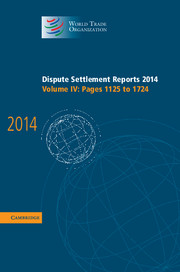China - Measures related to the Exportation of Rare Earths, Tungsten, and Molybdenum (WT/DS431, WT/DS432, WT/DS433): Reports of the Panel
Published online by Cambridge University Press: 28 September 2017
Summary
INTRODUCTION
Complaints by the United States, the European Union, and Japan
On 13 March 2012, the United States, the European Union, and Japan each requested consultations with China pursuant to Articles 1 and 4 of the Understanding on Rules and Procedures Governing the Settlement of Disputes (DSU) and Article XXII of the General Agreement on Tariffs and Trade 1994 (GATT 1994) with respect to the measures and claims set out below.
Consultations were held on 25-26 April 2012. These consultations did not resolve the dispute.
Panel Establishment and Composition
On 27 June 2012, the United States, the European Union, and Japan each requested the establishment of a panel pursuant to Article 6 of the DSU with standard terms of reference. At its meeting on 23 July 2012, the Dispute Settlement Body (DSB) established a single panel pursuant to the requests of the United States, the European Union, and Japan in accordance with Article 9.1 of the DSU.
The Panel's terms of reference are the following:
To examine, in the light of the relevant provisions of the covered agreements cited by the parties to the dispute, the matter referred to the DSB by the United States in document WT/DS431/6, the European Union in document WT/DS432/6, and Japan in document WT/DS433/6 and to make such findings as will assist the DSB in making the recommendations or in giving the rulings provided for in those agreements.
On 12 September 2012, the United States, the European Union, and Japan requested the Director-General to determine the composition of the panel, pursuant to Article 8.7 of the DSU. On 24 September 2012, the Director-General accordingly composed the Panel as follows:
Argentina, Australia, Brazil, Canada, Colombia, the European Union (with respect to WT/DS431 and WT/DS433), India, Indonesia, Japan (with respect to WT/DS431 and WT/DS432), the Republic of Korea, Norway, Oman, Peru, the Russian Federation, the Kingdom of Saudi Arabia, Chinese Taipei, Turkey, the United States (with respect to WT/DS432 and WT/DS433), and Viet Nam notified their interest in participating in the Panel proceedings as third parties.
- Type
- Chapter
- Information
- Dispute Settlement Reports 2014 , pp. 1127 - 1698Publisher: Cambridge University PressPrint publication year: 2016
- 3
- Cited by

